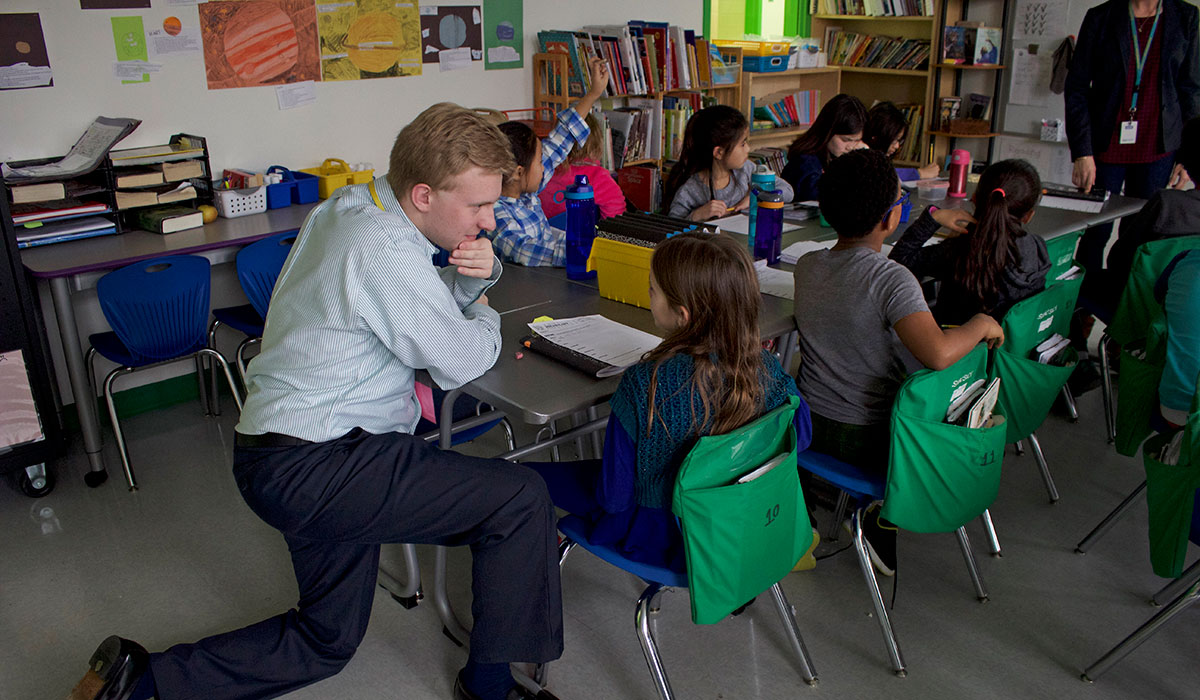
We are accepting applications for the Fall 25 Freshman Class.
General Program Information
Candidates who wish to teach children in classrooms that are largely self-contained (Grades 1st-6th) should major in elementary education. Elementary candidates' program of studies includes Catholic University's general education requirements, professional education courses required by the certifying authorities in most states, and a teaching specialization.
Elementary candidates have the opportunity to take the two additional courses in early childhood education if they are interested in pursuing and Early Childhood Endorsement to their Elementary Education Standard Teaching Credential after successful completion of the program. Candidates interested in pursuing an Early Childhood Endorsement should discuss the requirements and determine a plan of study early in the program with their Education Advisor.
Recommended Program of Studies
Elementary Education (ELE) Program Course Requirements: Education Courses
Coming Soon: Program Tracking By Semester!
We are currently developing content for this page for easier reference to the course sequence. In the meantime, students should check with their Program Advisor for details about required courses and semester registration.
Minors
Candidates can obtain the form to declare their minor from the Undergraduate A&S Dean's office website link https://arts-sciences.catholic.edu/academics/undergraduate-programs/advising/forms.html.
Once the form is completed, candidates must meet with their minor and major advisor to plan their program of studies for a timely graduation.
Elementary Education Majors - can minor in many disciplines, such as religion, philosophy, language, music, art, biology, chemistry, drama, history and others. See the undergraduate list of minors for a complete list of minors and their requirements.
Arts & Sciences Majors - are eligible to minor in Elementary Education. In order to get a minor in Elementary Education, students must declare the minor in Elementary Education with the A&S Undergraduate Programs Office and take the following courses:
|
The following five courses are required: |
|
| EDUC 251 | Foundations of Education |
| EDUC 261 | Human Growth and Development OR Elective |
| EDUC 271 | Psychology of Education |
| EDUC 313 |
Classroom Management Note: There is a classroom practicum (observation) component associated with this course. Students will work with their minor advisor and course instructor to meet this requirement. Alternate course assignments are available if the minor candidate chooses not to participate in a field placement. |
| EDUC 312 |
Curriculum and Instruction in Early Childhood and Elementary School Note: There is a classroom practicum (observation) component associated with this course. Students will work with their minor advisor and course instructor to meet this requirement. Alternate course assignments are available if the minor candidate chooses not to participate in a field placement. |
| Students select ONE Education Elective: These selections vary by semester and year. The following are some popular choices taken by ELE Minor candidates. | |
| EDUC 381 | Educating Diverse Learners |
| EDUC 422 | Race, Class, Disability and Gender in Education |
| EDUC (elective) | A variety of courses are offered each year to meet this requirement. Students should meet with their advisor to determine the best fit for their interests and goals. |
Policies on Arts & Sciences minors can be found here.
Advising
Candidates are required to meet with their advisor every semester to ensure they register for the appropriate courses to fulfill all program requirements on time. It is vital that Elementary Candidates take the appropriate elective and Liberal Arts core courses to fulfil the ELE major and licensure requirements.
